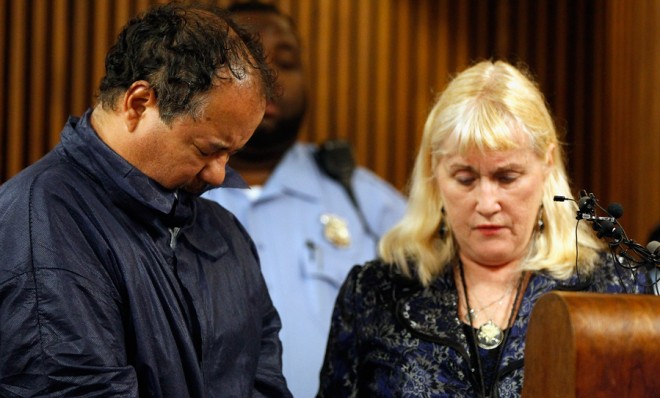Should prosecutors seek the death penalty for Cleveland kidnapping suspect Ariel Castro?
Castro could face murder charges for allegedly beating one of his impregnated captives until she miscarried


A free daily email with the biggest news stories of the day – and the best features from TheWeek.com
You are now subscribed
Your newsletter sign-up was successful
Cuyahoga County, Ohio, prosecutor Thomas McGinty says he might seek the death penalty against Ariel Castro, the man accused of kidnapping three women — Amanda Berry, Gina DeJesus, and Michelle Knight — then raping and imprisoning them in his Cleveland home for a decade. Castro is being held on $8 million bail, and could be prosecuted for hundreds or even thousands of offenses.
Capital punishment would only be an option if prosecutors were to decide to also charge Castro, 52, with aggravated murder. While all three women survived — as did Berry's daughter, a 6-year-old who was born during the 10-year ordeal — at least one of the women says Castro impregnated her five times and beat her so severely each time that she miscarried. Of all the alleged crimes Castro has to answer for, it's the deaths of the alleged victims who were never born that could result in his execution.
Many people do in fact believe that death is the only appropriate punishment for the monstrous cruelty described by the survivors and, police say, by Castro himself. Even Castro's own children were among the first to say publicly that he deserves no mercy: Only the death penalty can make Ariel "suffer the consequences," says Arlene Castro, 22, one of the suspect's five children. Another, Angie Gregg, called her father a "demonic criminal" and said she has zero sympathy for him. "He is dead to me," Gregg said.
The Week
Escape your echo chamber. Get the facts behind the news, plus analysis from multiple perspectives.

Sign up for The Week's Free Newsletters
From our morning news briefing to a weekly Good News Newsletter, get the best of The Week delivered directly to your inbox.
From our morning news briefing to a weekly Good News Newsletter, get the best of The Week delivered directly to your inbox.
But what does the law say? Actually, it's pretty clear, says Douglas A. Berman at Sentencing Law and Policy. Ohio state law says, explicitly, that "the unlawful termination of another person's pregnancy" amounts to aggravated murder, particularly when this happens in the course of other crimes, including rape and kidnapping. Berman explains:
I do not mean here to assert that state prosecutors must now seek the death penalty in their prosecution of Castro. I can envision lots of sound reasons for local prosecutors to decide not to seek the punishment of death here — especially if Castro's three primary victims indicate a strong disinclination to go through the difficulties (and media sensation) of a full-blown capital trial and the inevitable appeals that would likely follow if a jury imposed a death sentence.
But I do mean to assert that state prosecutors should now be considering how they will present to an Ohio grand jury the evidence which could support a charge of Aggravated Murder based on Castro's alleged repeated purposeful efforts to unlawfully terminate Michelle Knight's pregnancies. [Sentencing Law and Policy]
Not everyone thinks the death penalty is appropriate in this case, considering that abortion is legal. "My goodness me, we're confused on the issue of life," says Charles C.W. Cooke at National Review. "Ariel Castro, it seems, could be executed for his crimes. Not for rape or kidnapping — the nonsense of Coker v. Georgia took care of that" — but for the "aggravated murder" of unborn children:
This means that if you kill an unborn child in Ohio with the mother's permission, it's okay; if you do it without her permission, it's murder. The unborn child, therefore, is only a life if the mother says it is a life. That makes no logical sense at all. It is the logic of slavery, not of individual liberty. Who will defend it? [National Review]
A lot of people will, as it turns out. It comes as no surprise that "abortion foes are already using Castro's trial as a vehicle to express their opposition to reproductive freedom," says Ian Millhiser at Think Progress. Some of these people "will clamor for Castro to be killed by the state in the hopes of creating a precedent establishing that a fetus is a 'human life,'" says Millhiser. The problem with their logic is that what makes this potentially a capital case is what was allegedly done to woman and unborn child alike:
As a constitutional matter, there is nothing improper about treating involuntary termination of another's pregnancy as a very serious crime. The Supreme Court's decisions recognize "the right of the woman to choose to have an abortion before viability and to obtain it without undue interference from the State." This is a right that belongs to the pregnant woman, not to monsters who would violently impose their wishes upon a woman. So even if the alleged miscarriages in this case occurred before "viability," Castro will find little comfort in the Court's abortion decisions. Nor should he. It is tough to imagine a more depraved act than intentionally abusing a woman until she miscarries. [Think Progress]
But some worry that seeking the ultimate punishment based on the miscarriages diverts attention from Knight, Berry, and DeJesus, who endured unimaginably brutal treatment for years. "I understand the drive to send this man to his death — he seems like a monster," says Emily Bazelon at Slate. "And I can also see why states treat the forced termination of a pregnancy as a significant crime. I still think, though, that there would be something very strange about executing Castro for the harm he did to fetuses, as opposed to the harm he did to three living and breathing women."
A free daily email with the biggest news stories of the day – and the best features from TheWeek.com
Harold Maass is a contributing editor at The Week. He has been writing for The Week since the 2001 debut of the U.S. print edition and served as editor of TheWeek.com when it launched in 2008. Harold started his career as a newspaper reporter in South Florida and Haiti. He has previously worked for a variety of news outlets, including The Miami Herald, ABC News and Fox News, and for several years wrote a daily roundup of financial news for The Week and Yahoo Finance.
-
 Touring the vineyards of southern Bolivia
Touring the vineyards of southern BoliviaThe Week Recommends Strongly reminiscent of Andalusia, these vineyards cut deep into the country’s southwest
-
 American empire: a history of US imperial expansion
American empire: a history of US imperial expansionDonald Trump’s 21st century take on the Monroe Doctrine harks back to an earlier era of US interference in Latin America
-
 Elon Musk’s starry mega-merger
Elon Musk’s starry mega-mergerTalking Point SpaceX founder is promising investors a rocket trip to the future – and a sprawling conglomerate to boot
